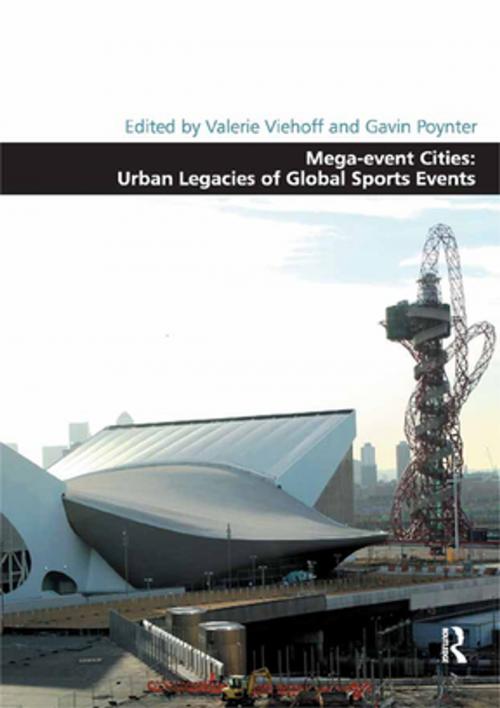Mega-event Cities: Urban Legacies of Global Sports Events
Nonfiction, Social & Cultural Studies, Political Science, Politics, City Planning & Urban Development, Social Science, Human Geography| Author: | Valerie Viehoff, Gavin Poynter | ISBN: | 9781317097952 |
| Publisher: | Taylor and Francis | Publication: | March 2, 2016 |
| Imprint: | Routledge | Language: | English |
| Author: | Valerie Viehoff, Gavin Poynter |
| ISBN: | 9781317097952 |
| Publisher: | Taylor and Francis |
| Publication: | March 2, 2016 |
| Imprint: | Routledge |
| Language: | English |
Mega-events represent an important moment in the life of a city, providing a useful lens through which we may analyse their cultural, social, political and economic development. In the wake of the International Olympic Committee’s (IOC’s) concerns about ’gigantism’ and wider public concerns about rising costs, it was imperative in the C21st to demonstrate the long term benefits that arose for the city and nations from hosting premier sporting events. ’London 2012’ was the first to integrate the concept of legacy from the moment a bid to host the Olympic and Paralympic Games was being considered. London proposed an ambitious programme of urban renewal for East London. Subsequent host city bids have adopted the ’legacy narrative’ and, as this book demonstrates, aligned this to major schemes of urban development and renewal. Bringing together scholars, practitioners and policy makers, this book focuses upon the legacies sought by cities that host major sports events. It analyses how governments, the IOC and others define and measure ’legacy’. It also focuses upon the challenges and opportunities facing future host cities of mega-events, looking at their aspirations and the intended impact upon their domestic and international development. It questions what the global shift in geographical location of mega-events means for sports development and the business of sport, what the attractions are for cities seeking to harness the hosting of a mega-event, and whether there may be longer term consequences for the bidding and hosting major sporting events in the wake of the widespread social unrest that accompanied the preparations in Brazil for hosting the FIFA World Cup (2014) and the summer Olympics (2016) and in Turkey, where there was significant opposition to bid for the 2020 summer Olympiad.
Mega-events represent an important moment in the life of a city, providing a useful lens through which we may analyse their cultural, social, political and economic development. In the wake of the International Olympic Committee’s (IOC’s) concerns about ’gigantism’ and wider public concerns about rising costs, it was imperative in the C21st to demonstrate the long term benefits that arose for the city and nations from hosting premier sporting events. ’London 2012’ was the first to integrate the concept of legacy from the moment a bid to host the Olympic and Paralympic Games was being considered. London proposed an ambitious programme of urban renewal for East London. Subsequent host city bids have adopted the ’legacy narrative’ and, as this book demonstrates, aligned this to major schemes of urban development and renewal. Bringing together scholars, practitioners and policy makers, this book focuses upon the legacies sought by cities that host major sports events. It analyses how governments, the IOC and others define and measure ’legacy’. It also focuses upon the challenges and opportunities facing future host cities of mega-events, looking at their aspirations and the intended impact upon their domestic and international development. It questions what the global shift in geographical location of mega-events means for sports development and the business of sport, what the attractions are for cities seeking to harness the hosting of a mega-event, and whether there may be longer term consequences for the bidding and hosting major sporting events in the wake of the widespread social unrest that accompanied the preparations in Brazil for hosting the FIFA World Cup (2014) and the summer Olympics (2016) and in Turkey, where there was significant opposition to bid for the 2020 summer Olympiad.















